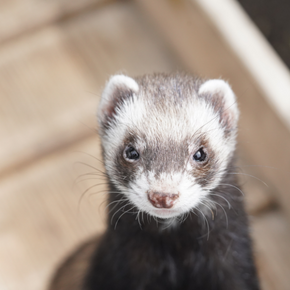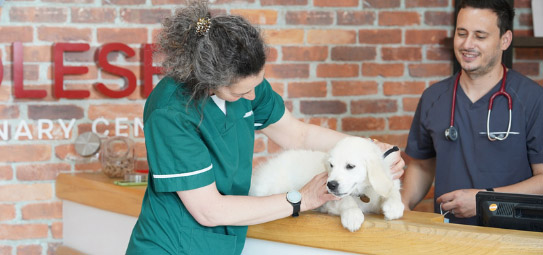
Ferrets in season – make a plan now with Molesey Vets
March 7, 2023
Ferrets are known for their adorable and energetic personalities, and in the summer months, these furry little creatures can be especially active. But did you know that ferrets actually have a specific heat season? Our Head Vet, Darren Partridge, is here to explain all about the female ferret’s breeding season and why making a decision now about their productive care can save your pet a lot of grief.
Get reproductive care for your jill
The ‘jill season’
Female ferrets, or ‘jills’, like many other animals, have a breeding season that is triggered by changes in daylight hours. The ferreting season typically begins in late spring and lasts through late summer or early autumn (typically March to September). During this period, ferrets enter a period of active and reproductive behaviour known as “jill season.”
According to Darren, both male and female ferrets reach sexual maturity in their first spring, which means they can be as young as four months of age when they first come into heat.
During this breeding season, also known as the ‘diestrus’ stage, female ferrets experience a surge of oestrogen, which leads to the development of a receptive attitude towards mating and the ability to become pregnant.
Risks and problems
For pet ferrets, the breeding season can be a source of unwanted behaviour such as aggression and persistent vocalisation, as well as an increased risk of health issues, such as mammary tumours and anaemia. The increase of oestrogen also reduces the production of red blood cells. This can cause anaemia which if left unmanaged, can be life threatening.
A continuous season…
Once a heat cycle has ended, another cycle can start if the female is still within the breeding period. Only mating or the end of the breeding season can end a jill’s heat. So, if you’re not planning on breeding your ferret, Darren advises that it’s wise to stop your female from cycling.
How to help a female ferret during their heat cycle
There are several ways you can help a female ferret during her heat cycle:
Spay your female ferret
The most effective way to prevent heat cycles in female ferrets is to spay them. Spaying involves removing the ovaries and uterus. This prevents the production of hormones that trigger the heat cycle and also eliminates the risk of certain health issues such as mammary tumours and anaemia.
Hormonal therapy
If you are unable or unwilling to spay your ferret, hormonal therapy can be used to suppress the heat cycle. A synthetic hormone in the form of a subcutaneous implant can be placed under your ferret’s skin by a vet. Alternatively, a pill can be given to ferrets to suppress the breeding season. Talk to one of our vets at Molesey Vets in Surrey about the best option for your jill.
Environmental changes
During a heat cycle, female ferrets may become more aggressive and vocal. To help reduce these behaviours it is important to provide them with a calm and quiet environment. Avoid handling or disturbing them too often and provide a comfortable and private space to rest.
Keep them physically active
During a heat cycle, female ferrets may become less active. Encourage them to engage in playful and interactive activities by placing toys in their enclosure to help reduce stress and maintain a healthy weight.
Monitor their health
It’s important to keep a close eye on your jill’s health during a heat cycle. Book an appointment with one of our vets if you notice any signs of ill-health, or if your ferret becomes lethargic, loses their appetite, or has become excessively vocal.
It is important to note that hormonal therapy for ferrets (and surgical intervention) is not without risk and should be discussed with a vet – book an appointment with Darren or any of our exotic pet enthusiasts. Ferrets may be more susceptible to certain health issues after hormonal therapy and regular veterinary check-ups are needed to monitor for these.
It is important to note that hormonal therapy for ferrets (and surgical intervention) is not without risk and should be discussed with a vet. Ferrets may be more susceptible to certain health issues after hormonal therapy and regular veterinary check-ups are needed to monitor for these.
The key thing to remember here is that you must understand the options and implications for your pet and act early, before your jill first comes into heat.
Book an appointment at our East Molesey surgery so our vets can talk you through the options.



